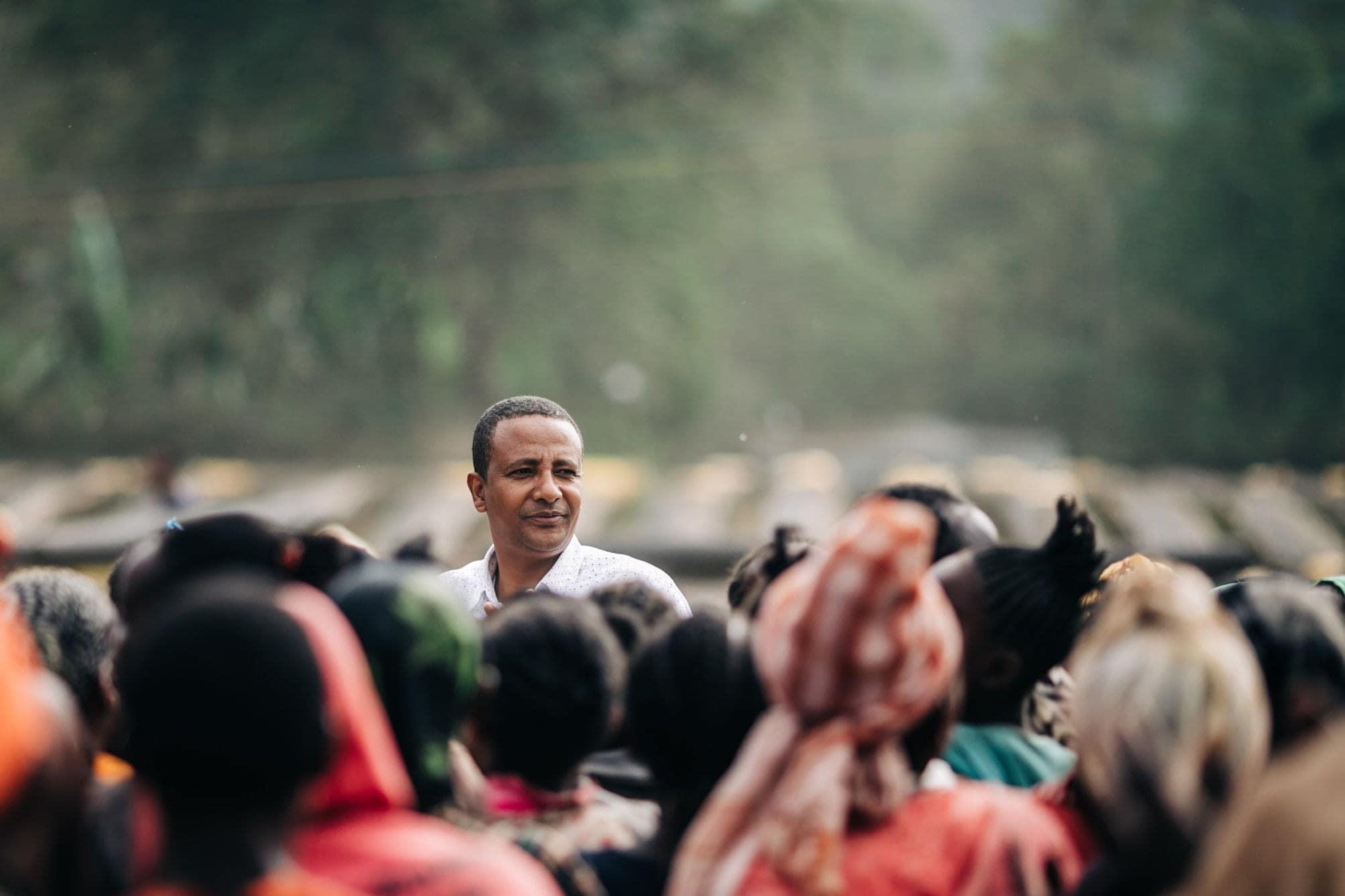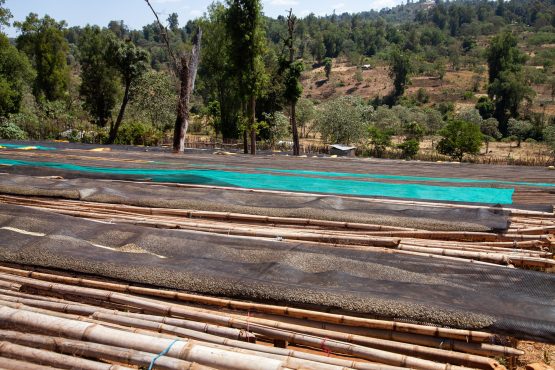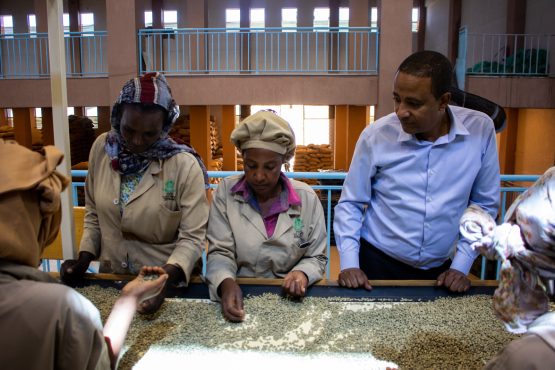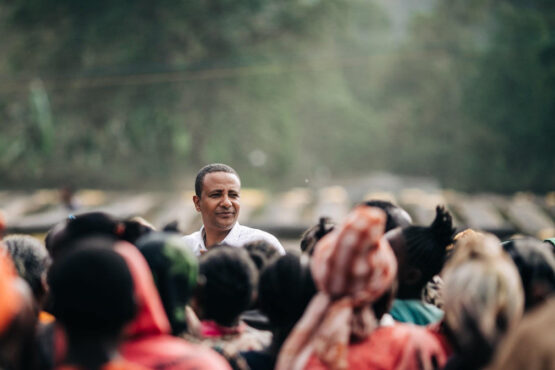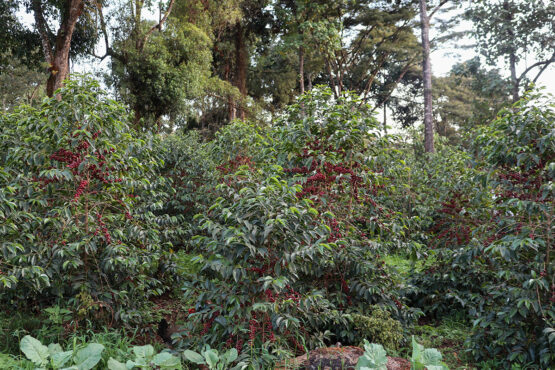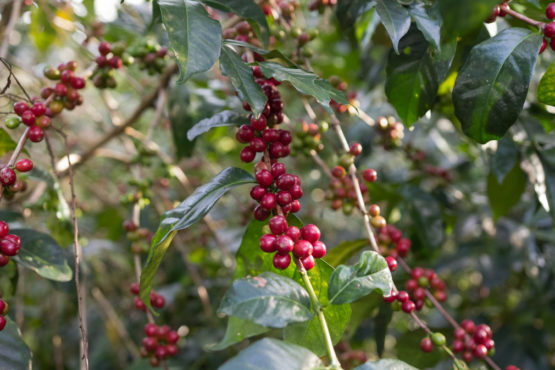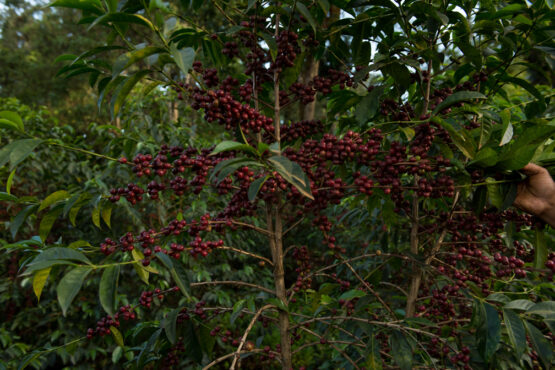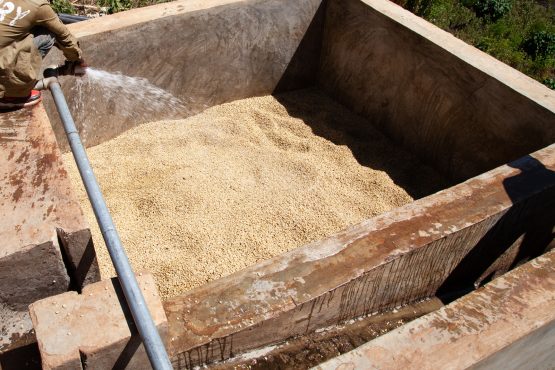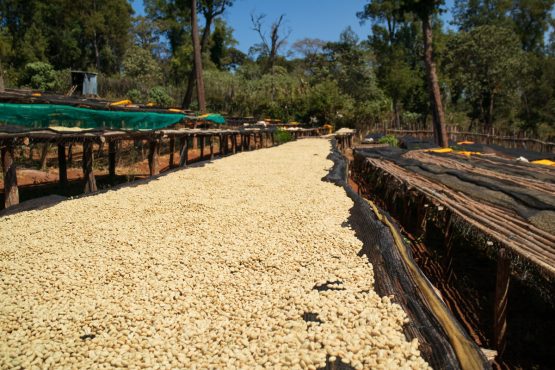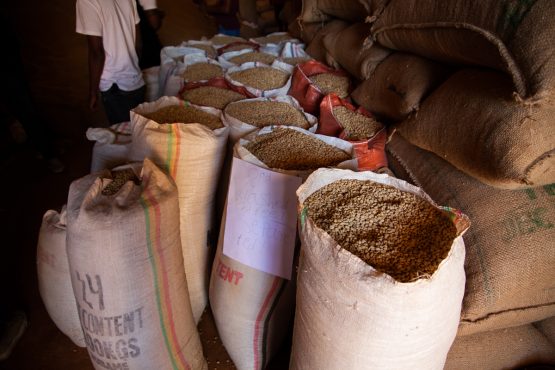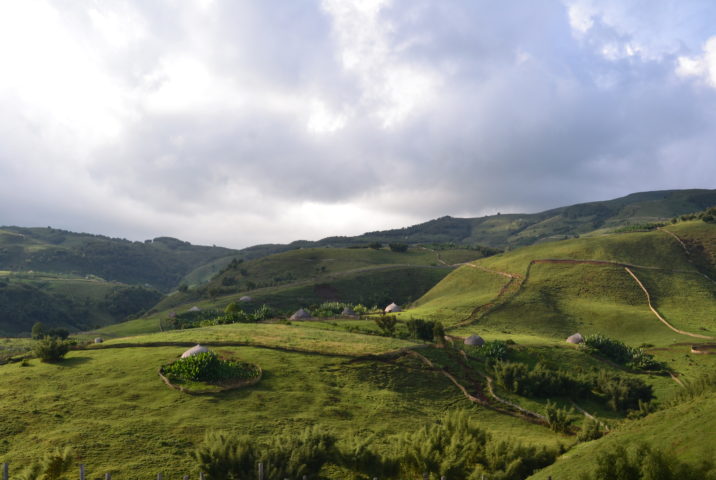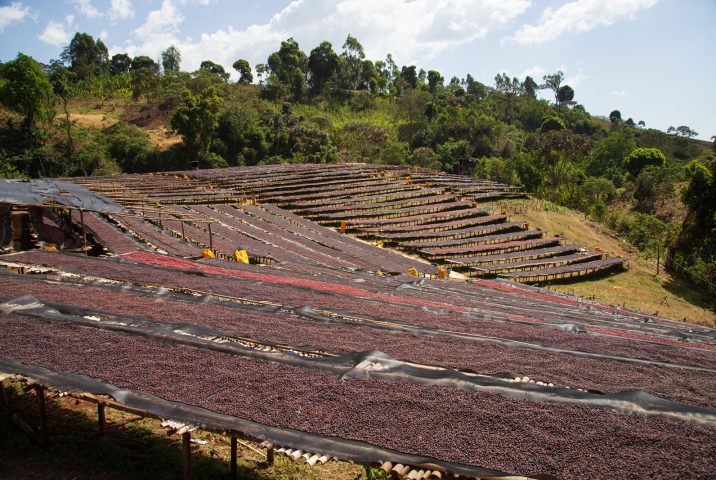Faysel Abdosh Washed Premium
Complex and distinct. Blood plum, strawberry and nectarine, with cane sugar sweetness and a lingering, perfumed finish.
This award-winning, single producer lot was grown on Faysel Abdosh Yonis’ privately-owned estate Guji Wolebo, and processed at Jigesa washing station. Mr. Faysel (pictured above) is the founder and owner of Testi Specialty Coffee, a coffee-exporting company that owns and operates twenty quality-focused washing stations across Ethiopia’s most renowned coffee regions, including Jigesa.
With a score of 90.75, this outstanding lot placed first in the Washed category of the African Fine Coffees Association (AFCA)’s 2023 Taste of Harvest Competition, an annual competition that seeks out for the continent’s most exquisite coffees. The event receives samples from quality-focused coffee producers, cooperatives, millers, and exporters around Africa, which are evaluated by a panel of experienced local and international judges using methods and protocols established by the Coffee Quality Institute (CQI) and Specialty Coffee Association (SCA). For the 2023 event, AFCA evaluated a total of 101 samples from 85 participants. We are thrilled to offer this winning lot, which we purchased directly from Testi and air-freighted to Melbourne.
ABOUT JIGESA WASHING STATION
Jigesa (pronounced “Jee-gee-sa”) is a privately-owned washing station that is located in the Shakisso woreda (administrative district) in Ethiopia’s Guji zone. It is named after the kebele (local village) of Jigesa. The washing station is one of twenty owned and managed by Testi Coffee, a family-owned company founded by Mr Faysel Yonis.
Sitting at 1,740m above sea level, Jigesa produces exceptional washed and natural processed lots. The washing station was established in 2014, and currently employs between 250-260 seasonal workers—around 200 of them are women who hand-sort parchment, while the remaining 50 work at the onsite dry mill. During harvest, freshly picked coffee cherry is delivered daily by some 500 independent outgrowers from the nearby kebele of Dambi Uddo and collection points in Wese and Suke.
The majority of the families that contribute to this station farm organically on tiny plots of land, which average just 2–5 hectares in size. Coffee is their main cash crop and grows alongside food crops of corn, grain and bananas, under the shade of native Birbira, Wanza, and Acacia trees. The average elevation of the farms in this region is very high – around 1,800–2,050m above sea level – and this, combined region’s cool temperatures (which range between 15-20°C) is ideal for the slow ripening of coffee cherries, leading to denser beans and a sweeter, more complex cup profile.
ABOUT THE GUJI ZONE
The Guji zone was established as a unique production area in 2002. It is located in the southern portion of the political region of Oromia and is named after the Oromo people: a tribe with a long, proud history in coffee production.
Prior to 2002, coffees from Guji were sold under the broader classification of Sidama, a huge producing region covering much of central-south Ethiopia. Today, coffees from Guji are classified separately and are recognised worldwide for their unique and distinctive cup profile. This distinctiveness is driven by the unique combination of elements in this production area, including high elevations, rich, fertile soil, and exceptional heirloom varieties. Most communities in the region still live rurally and make a living from farming, with few or no agrochemicals used on the fields. Coffee remains the major cash crop for most families in the Guji region, who grow coffee alongside food for consumption.
Guji is bordered on the south and west by Borena, on the north by Gedeo and Sidama, and on the east by Bale and the Somali Region. Coffees that are classified as ‘Gujis’, originate from the ‘woreda’ (administrative regions) of Adoola Redi, Uraga, Kercha, Bule Hora, and Shakisso, which is where this lot is from.
ABOUT THE SIDAMA COFFEE REGION
Historically, Sidama refers to a wide geographical region encompassing much of central-south Ethiopia, that is well known for producing exceptional natural and washed coffees. The region is located in Ethiopia’s South East Coffee Zone, and includes renowned coffee-producing localities such as Yirgacheffe, Kochere, West Arsi, Bensa and Guji. Sidama extends across the states of Oromia and the Southern Nations, Nationalities, and People’s Region (SNNPR), two of eleven ethnically-based regional states of Ethiopia. After a 2019 Referendum, some of the territories that fall under the the Sidama coffee region have separated from the SNNPR and become the autonomous Sidama regional state.
Coffees that are grown and processed in Sidama showcase an extremely diverse range of flavour profiles, and are noted for their intensely fruit-forward, tea-like, floral and complex character that is sought after worldwide. It is widely accepted that the coffee species, Arabica, originated in the lush forests of southern forests of Ethiopia and hence growing conditions in this area are perfectly suited for producing exquisite coffees.
The Sidama coffee region is named for the Sidama people, a tribe with a long and proud history of coffee production. Coffee has been here for centuries and is an important source of income for rural households, who grow it as the primary cash crop. Family plots are small and intensively farmed with intercropped coffee, food crops like pulses, grain and yams, and other cash crops like khat (similar to tobacco) and Ethiopian banana. Most farms are planted amongst or alongside indigenous forest trees, which provide a thick canopy of shade for the coffee trees. Historically, farmers in this area will use organic farming practices (although it is unlikely to be certified) as there is no ready access to artificial fertilisers or pesticides.
VARIETY
This coffee is mostly made up of local landrace varieties Kurume and Wolisho.
For many years, most Ethiopian coffees have been described as being a mix of cultivated and wild varieties, referred to as “heirloom varieties.” This is a term that is all-encompassing and used by many actors in the coffee industry to generally categorise Ethiopian coffee varieties that are from native forest origins. Whilst “heirloom” describes many of the varieties found in Ethiopia, it is also a bit simplistic and does not acknowledge the varieties that are already locally recognised and purposely cultivated, or those that have been specifically developed and widely distributed by the Jimma Agricultural Research Centre (JARC).
Sidama is home to many landrace varieties that were originally selected from the forest and have been propagated successfully for decades. There are five popular varieties that are named after indigenous trees in the area— Bedessa, Kurume, Mique, Sawe and Wolisho. There is little documentation on the history of these varieties, and it is hard to know if they represent a single plant or a wider group of varieties; however, it is widely accepted that they play a major role in the quality and floral flavour profile of the coffee from this region. JARC varieties were developed using “mother trees” from Ethiopia’s coffee forests, and are now grown for disease and pest resistance, as well as exceptional cup profile, and are released by number. For example, 74110, 74112 and 74116 are all widely propagated in the Sidama growing region.
PROCESSING
This coffee has been processed using the washed method, using clean water from the Mormora and Bishan Dimo rivers. It is classified as Grade 1, the highest quality classification for Ethiopian coffees, indicating a great deal of effort has been put into the selection and grading during processing.
Coffee cherries for this lot were carefully handpicked at Guji Wolebo, and taken to Jigesa washing station for processing. Upon arrival, they were left to pre-ferment aerobically for up to 72 hours. Some 95% of the cherries selected were perfectly ripe, with the remaining 5% being slightly over-ripe. These are then water sorted to remove all “floaters,” which are lower in density and considered to be of inferior quality.
After sorting, the coffee cherries are pulped, to remove the fruit and skin, and graded by weight. The parchment-covered coffee is then left to ferment in tank for another 72 hours, intensifying the inherent flavours of the beans and further elevating the cup quality. To ensure no undesirable flavour are introduced during this process, mill workers keep a close eye on the clarity of the water being used and replace it with fresh, cold water every 24 hours. The use of cold water is key during this step, as it slows down the ongoing fermentation, resulting in more complexity in the final cup.
Once the fermentation process is complete, the parchment is then re-washed and laid out to dry on raised African drying beds and under a parabolic shade net for 21 days depending on weather conditions. Whilst drying, the coffee is carefully hand-sorted, and any defects are removed. It is also turned regularly to ensure that it dries evenly and consistently. Once the coffee is dry and has reached its desired humidity, it is rested in parchment until it is ready for milling and export.
HOW THIS COFFEE WAS SOURCED
Since 2018, regulation changes within the Ethiopian coffee industry have allowed smallholder producers and coffee washing station owners to export coffee directly to the international market, rather than through the Ethiopian Commodity Exchange (ECX), a model called Vertical Integration. While the ECX has provided stability and opportunity for many Ethiopian coffee farmers, it does not service the specialty market well, as there is an inherent lack of transparency and traceability in its auction model, and more points for potential corruption or confusion between the producing communities and the final buyer.
Vertical Integration enables a more streamlined coffee supply chain and provides an opportunity for the increased traceability and transparency of coffee trade in Ethiopia. Beyond this, producers or exporters who market and trade their coffee directly can access higher prices and more direct payments for their coffees. All of the coffee we purchase in Ethiopia is bought outside of the ECX system.
WHY WE LOVE IT
The word “testi” means happiness in the Harrari language, which is fitting as their coffees make us very happy! This coffee showcases the distinctiveness and exceptional potential of coffees from the Guji region.
